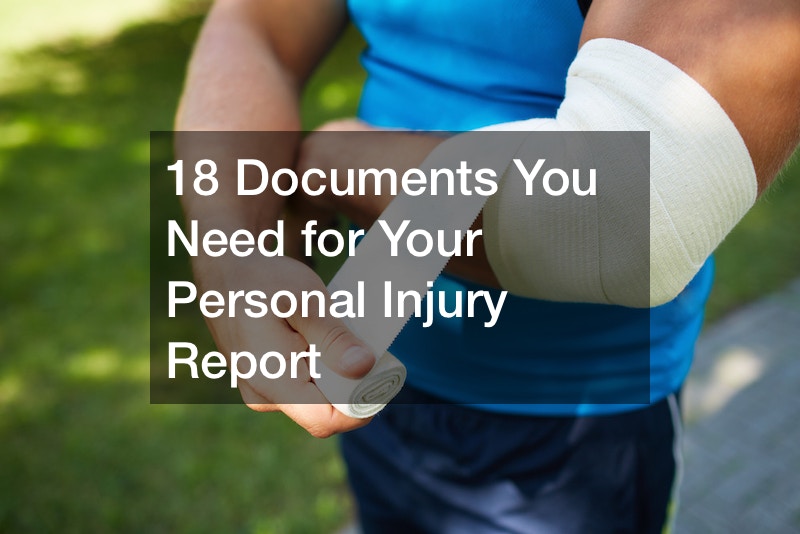
Getting an injury can be a distressing experience, often accompanied by physical pain, emotional trauma, and financial burdens. Whether you were involved in a car accident, slipped and fell in a public place, or experienced any other incident resulting in injury, it’s crucial to understand the importance of documentation. Collecting and organizing the right documents can significantly impact your ability to pursue a successful claim and seek fair compensation for your losses.
Filing A Personal Injury Report
It’s necessary to file a personal injury report as it’s used to determine the outcome of your case during investigations of the occurrence of your accident. Your compensation will depend on how detailed you collate relevant documents, forming a critical part of your evidence. The following are 18 essential documents you need for your personal injury report:
1. Incident Report

This simple document holds immense power to protect your rights and serve justice. An incident report is an official record capturing vital details about the accident or injury. It helps establish liability, provides evidence of the incident, and strengthens your case when seeking compensation. Whether it’s a car accident, workplace injury, or slip and fall incident, filing an incident report is essential for your legal journey.
Remember, accuracy is key! Include the date, time, location, parties involved, and other relevant information. This report is prepared by law enforcement, medical professionals, and property owners.
2. Medical Records
In any personal injury report, medical records play a vital role in establishing the severity of your injuries, determining the required medical care, and ensuring you receive appropriate compensation. Medical records such as X-rays, doctor’s notes, prescriptions, and diagnostic reports provide crucial evidence of the nature and extent of your injuries, detailing the medical treatments and procedures you’ve undergone. These records serve as a solid foundation for your claim, helping your legal team demonstrate the impact of the injury on your health and quality of life.
While medical records are often the primary focus, dental care should not be overlooked. Dental records include dental charts, X-rays, treatment notes, and invoices related to dental procedures. These records provide important evidence of any dental injuries sustained, the treatment received, and associated costs.
3. Dental Reports
Cosmetic dental care holds significance in injury reports as it addresses the aesthetic aspects of dental damage caused by an accident or injury. By restoring the appearance of the affected teeth through treatments such as veneers, bonding, or crowns, cosmetic dental care helps individuals regain their smiles.
4. Photographs and Videos
Immediately after the occurrence of an accident, it’s important to take photographs and videos. Remember to include the incident scene, injuries, property damage, or any other details that can be used in evaluating the occurrence of the accident. Visuals establish the extent of the injuries, so include time stamps and descriptions for each video or image to provide context in your personal injury report.
5. Witness Statements

Contact individuals at the scene and collect individual contact information. Request written or recorded statements detailing what they saw and experienced. Use your knowledge to establish if the information given is accurate. These statements are critical as they strengthen your case by collaborating with your version of the events of your injury claim.
6. Police Report
Obtain a copy of the police report when law enforcers are involved, as this will strengthen your position in claiming your personal injury compensation as it carries significant weight. This report contains objective observations, statements from the parties involved, and any citations or charges.
7. Insurance Correspondence
When reporting an injury, engaging with insurance companies through correspondence is a critical step in the process. Initiating the compensation claim involves documenting an accident’s details through insurance correspondence. This formal correspondence between the insurance provider and the injured party is critical in making your claim successful later.
In insurance correspondence, the injured person provides a detailed account of the incident, including the date, time, location, and parties involved. This report helps establish the foundation for the claim and ensures that all essential information is documented accurately. Additionally, insurance correspondence allows the injured party to explain the extent of their injuries, the medical treatments received, and the financial losses incurred as a result. Providing clear and comprehensive information in insurance correspondence can help facilitate a smooth claims process and protect the injured party’s rights.
8. Auto Insurance Quote
An auto insurance quote outlines the specifics of the accident, including the vehicles involved, any property damage, injuries sustained, and witness statements. Auto insurance reports serve as an official record of the incident to help establish liability and determine the coverage provided by the auto insurance policy. Failing to file an auto insurance report on time may result in complications or delays in the claims process, potentially jeopardizing the injured party’s ability to receive adequate compensation.
9. Financial Documents

A personal injury report demonstrates the negative economic impact of your injuries. Gather medical bills, pharmacy receipts, medical equipment or service invoices, and income fortified due to the accident. An assigned letter from your employer can strengthen your claim.
10. Expert Opinion
In the case of complex injuries, expert and specialist opinions are essential. They provide valuable insights and credibility, help establish liability, and demonstrate a long-term impact on your quality of life.
11. Communication Log
Maintaining a communication log related to your personal injury report is vital. Include conversation or interaction with insurance adjusters, healthcare providers, attorneys, and other parties involved. As mentioned previously, note the time, dates, and methods, which should be accurate. This log can serve as a reference and help you track the progress of your claim while ensuring all relevant information is included in your personal injury report.
12. 24-Hour Tow Truck Service

When an injury occurs, especially in cases of car accidents, the priority is to address any immediate medical needs and ensure the well-being of those involved. In such situations, a 24-hour tow truck service plays a crucial role by swiftly getting to the accident scene and safely removing damaged vehicles from the site.
Here are some specific ways in which a 24-hour tow truck service contributes to injury reporting:
Vehicle Removal: Damaged vehicles can obstruct traffic or pose additional safety risks after an accident. A tow truck service promptly removes the vehicles from the scene, ensuring a smooth traffic flow and creating a safer environment for those involved and the emergency responders.
Preserving Evidence: In certain cases, the positioning and condition of the vehicles involved in an accident can provide vital evidence for determining liability. A 24 hour tow truck service understands the importance of preserving the vehicles’ integrity and assists in carefully relocating them without compromising potential evidence.
Transporting Vehicles: If the injured party requires medical attention or their vehicle is inoperable, a tow truck service can transport the vehicle to a repair shop or desired location. This service ensures that injured individuals can seek medical assistance promptly and that their vehicle is securely transported for further evaluation or repairs.
Documentation: Tow truck operators also provide witness statements or information about the accident scene, especially if they arrived shortly after the incident. Their observations and documentation can contribute to the overall investigation and injury reporting process.
13. Spanish Personal Injury Lawyers
In injury reporting, having the assistance of personal injury lawyers can be invaluable, especially if you’re a Spanish-speaking individual or involved in an incident within the Spanish-speaking community. Spanish personal injury lawyers specialize in providing legal representation and guidance to individuals who’ve sustained injuries due to accidents or negligence.
The lawyers possess a deep understanding of personal injury laws and can communicate effectively in Spanish. This is crucial in ensuring that language barriers don’t hinder the accurate documentation and reporting of the injury. They can help you navigate complex legal processes, translate legal terms and concepts into understandable language, and protect your rights through injury reporting and claims. They can guide you in gathering the necessary documents, communicating with insurance companies, and building a strong case to get you the compensation you deserve.
14. Fire Sprinkler Companies
Fire sprinkler companies play a crucial role in injury reporting, particularly in cases where injuries occur due to fire incidents. These companies are responsible for designing, installing, inspecting, and maintaining fire sprinkler systems in various residential, commercial, and industrial buildings.
Injury reporting related to fire incidents often requires determining the cause and extent of the fire, as well as evaluating the effectiveness of the fire suppression system. Fire sprinkler companies can assist in this process by providing detailed reports on the design and installation of the sprinkler system, maintenance records, inspection schedules, and any repairs or modifications conducted. This information helps investigators and insurance companies assess whether the fire sprinkler system was functioning properly and if negligence or failure contributed to the injury.
Fire sprinkler companies may also play a role in post-incident investigations. They can offer expert opinions and technical analysis to determine if the fire sprinkler system adheres to the relevant building codes, industry standards, and regulations. Additionally, they can provide insights into any deficiencies or malfunctions in the system that may have affected its performance during the fire incident.
15. The Role of Massage in Injury Reporting
Massage therapy can play a significant role in injury reporting, particularly in cases where the injury involves soft tissue damage or musculoskeletal issues. Massage therapists are trained professionals who use manual techniques to manipulate muscles, tendons, ligaments, and other soft tissues to promote healing, alleviate pain, and improve mobility.
In their injury reporting, massage therapists can provide valuable insights and documentation regarding the client’s condition, progress, and response to treatment. They can offer detailed assessments of the affected areas, including a range of motion, pain levels, and observed changes or improvements over time, which can be used to show the extent of the injury and the effectiveness of the massage therapy.
Massage therapists can also collaborate with other healthcare professionals, such as physicians, chiropractors, or physical therapists, to develop comprehensive treatment plans and ensure a holistic approach to injury rehabilitation. They can provide input on the client’s response to various treatments and offer recommendations for ongoing care, exercise, and self-care practices that may aid recovery.
Besides their role in injury reporting, massage therapists can contribute to preventative measures. By identifying potential muscular imbalances, tightness, or areas of weakness, they can help clients address these issues before they lead to more severe injuries. Regular massage therapy sessions can improve overall musculoskeletal health, enhance flexibility, and reduce the risk of future injuries.
16. Auto Glass Service
Auto glass service providers specialize in repairing or replacing damaged vehicle windows or windshields. In injury reports related to incidents causing auto glass damage, their role is to assess and document the extent of the damage and provide necessary repair or replacement records.
17. Emergency Clinics
Emergency clinics or urgent care centers are critical in injury reports requiring immediate medical attention. They provide initial medical assessments, treatments, and documentation of injuries sustained in accidents or other emergencies. Their involvement ensures that injuries are promptly addressed, and medical records are established in the injury report.
18. Leadership Coaching
Leadership coaching plays a role in recovering and rehabilitating after an injury. Leadership coaches could assist individuals in developing resilience, coping strategies, and goal-setting to overcome challenges resulting from an injury. While not directly involved in documenting the injury, their role can support the individual’s overall well-being and long-term recovery.
After an accident, most people are not keen on collecting evidence as their immediate concern is to get well. While this is understandable, it’s important that you keep track of all documents arising from the accident in your personal injury report, including the correspondence between yourself and the insurance company. What may appear irrelevant now may be the evidence that’ll turn a compensation claim in your favor. If you’re not in a position to get the evidence you need, get a friend to help out or ask your injury compensation lawyer to follow through on your behalf.
When filing a personal injury report, the documents you gather and include play a crucial role in building a strong case and seeking the compensation you deserve. Each document uniquely documents the incident, establishes liability, and showcases the extent of your injuries and losses. From the incident report that captures the details of the event to medical records that provide a comprehensive view of your injuries, every document has a bearing on the overall strength of your claim.




